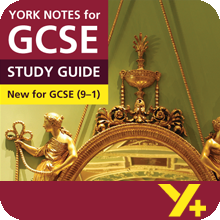Examiner's Notes
You assessed this answer as Grade 3.
Hover over the highlighted text to read the examiner’s comments.
Question: Read from ‘“Engaged to Mr Collins! my dear Charlotte ...”’ to ‘... happy in the lot she had chosen’ (Vol. 1, Ch. 22). In this extract, Charlotte Lucas explains to Elizabeth her reasons for accepting Mr Collins’s marriage proposal.
Starting with this extract, explore how Austen presents ideas about marriage.
Write about:
- how Austen presents ideas about marriage in this extract
- how Austen presents ideas about marriage in the novel as a whole.
Marriage is a major preoccupation for the characters in ‘Pride and Prejudice’ and Jane Austen is adept at presenting a range of attitudes. These are embedded within the wider social and economic context while also being expressed as important personal decisions. In this brief dramatic exchange, Charlotte Lucas’s decision to marry Mr Collins threatens the continuation of her friendship with Elizabeth Bennet.
Elizabeth’s initial exclamation, ‘Engaged to Mr Collins! My dear Charlotte, – impossible!’ is quite unlike her normal mode of speech and is not within social conventions. Even today it is polite to reply to an engagement announcement with congratulations. Austen frequently reveals her characters’ inner feelings through changes of colour and decisions involving movement. Here Charlotte’s countenance ‘gave way to a momentary confusion’ and later, after ‘an awkward pause’, she and Elizabeth separate.
Fortunately Elizabeth does find more appropriate words and she wishes Charlotte ‘all imaginable happiness’. Yet how much happiness is ‘imaginable’, when an intelligent woman like Charlotte chooses to marry a man like Mr Collins?
The friends have earlier had a discussion about marriage when Charlotte advised Elizabeth that her sister Jane should ‘show more affection than she feels’ in order to ‘secure’ Bingley. Charlotte has a thoroughly pragmatic view of marriage – she is not ‘romantic’ as she tells Elizabeth and she asks ‘only a comfortable home’. Elizabeth has never truly believed this and she is shocked to discover that her friend ‘would sacrifice every better feeling to worldly advantage’. Charlotte is not a weak character. She counter-attacks. ‘Do you think it incredible that Mr Collins should be able to procure any woman’s good opinion because he was not so happy as to succeed with you?’
Perhaps Elizabeth is rather naïve and over-confident in her own point of view? She is certainly left unhappy. Words such as ‘unsuitable’, ‘pang’, ‘sacrificed’, ‘distressing’ colour her reflections. It’s possible that the realisation that she has misjudged her friend may be the first step on the journey towards self-knowledge and humility that she must take throughout this novel.
Charlotte’s acceptance of Mr Collins is a milestone in the exploration of love, marriage and materialism. Austen is not afraid to offer strong arguments on either side and one of the most convincing is the effect that Charlotte’s marriage will have on her family. Her brothers are relieved because they will not have to support Charlotte (as Austen’s brothers supported her and her sister), and her sisters know that this will offer them more opportunities. Austen allows the readers a glimpse inside Charlotte’s mind. She realises Mr Collins ‘is neither sensible nor agreeable’ (stronger words then than now) ‘but still he will be her husband’. It’s as if one can hear her sigh with relief.
Elizabeth’s parents reacted quite differently to her refusal of Mr Collins and this indicates their different views on marriage. Mrs Bennet’s business is to ‘get her daughters married’ so she was angry whereas Mr Bennet offered his complete support. This was expressed with his characteristic irony. ‘Your mother will never see you again if you do not marry Mr Collins and I will never see you again if you do.' Much later in the novel, when Mr Bennet believes that Elizabeth is about to marry a man (Darcy) who she does not love, he expresses his fear more movingly. ‘Oh my child, do not let me have the grief of seeing you unable to respect your partner in life.’
Respect is vital (and so is money) but love is the quality which is not mentioned in these conversations. Other marriages, such as that of Jane and Bingley, show how important this is. Love and attraction is the foundation of the relationship between Jane and Bingley and the fact that Jane has made a good marriage financially is seen as of secondary importance. Elizabeth remarks on the balance in their relationship as ‘a general similarity of feeing and taste’. The reader has a sense that Jane and Bingley will be good for one another whereas from the extract we might feel that while Charlotte might be good for Mr Collins he will be far from good for her. We can see other examples of unsuitable marriages in Lydia and Wickham and Mr and Mrs Bennet, which Austen uses to compare with the happy marriages of Jane and Elizabeth.
